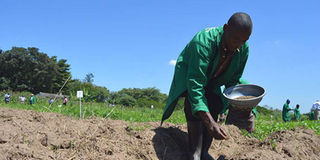Bt cotton lessons from Burkina Faso

Kenya Agricultural and Livestock Research Organisation workers plant Bt cotton in Kibos, Kisumu, on June 11, 2018. Anti-biotech crops’ crusaders should not use the half-truth of isolated cases to discredit ongoing research on Bt cotton. PHOTO | FILE | NATION MEDIA GROUP
What you need to know:
- The National Union of Cotton Producers of Burkina Faso has always backed the GM technology and has been pushing for its return to ensure a sustainable cotton industry.
- Through the Big Four Action Plan, the government is banking on Bt cotton to create 50,000 jobs and generate Sh20 billion in apparel export earnings per year.
At a forum on biotech crops and the Big Four Agenda at the University of Nairobi on April 24, critics of biotechnology, citing the Burkina Faso cotton fiasco, repeatedly misrepresented the facts about its genetically modified (GM) cotton farming.
The truth is, cotton production in the west African country has been on a downward slide since three years ago after the government phased out the pest-resistant GM cotton (also called Bt cotton).
In April last year, the Inter-professional Cotton Association of Burkina (AICB), an industry body comprising farmers and other sector players, set a production target of 800,000 tonnes for the 2018-19 season.
However, the country produced just 436,000 tonnes despite a record $27.4 million (Sh2.7bn) incentives to farmers in the form of government subsidies on insecticides, fertilisers and irrigation facilities.
BOYCOTTS
That was a 29 per cent decline from the 2017-18 output of 613,000 tonnes, which was down from the 2016-17 season’s 682,940 tonnes.
Formerly Africa’s largest cotton producer for a long time, Burkina Faso now ranks fourth, having lost the position to Mali two years ago, allegedly after it phased out GM cotton.
It trails Côte d'Ivoire (455,000 tonnes), Mali (653,000 tonnes) and Benin (675,000 tonnes).
The decline is attributed to factors such as regional farmer boycotts over unfair treatment, insecurity resulting from terrorist attacks and bad weather.
But farmers also blame the situation on increased pest attacks following the government’s decision to phase out GMO cotton and return to conventional seeds.
PESTS
As part of an effort to deal with increasing devastation by insect pests, Burkina Faso in 2008 approved the cultivation of Bt cotton, which offers inherent resistance to the destructive bollworm.
These pests have the potential to destroy up to 80 per cent of yield. Bt cotton helped farmers to cut down on insecticide spray from an average of eight times per season to three.
Overall, GM cotton reduced the use of pesticides by up to 70 per cent while increasing productivity by about 22 per cent and smallholder farmer profits by an average of 51 per cent.
Cotton processors however complained that fibre from the new varieties was shorter, and a decision was taken in 2016 to completely phase out GMO varieties and return to conventional seeds.
REVIVAL
The government, cotton companies and farmer groups have announced fresh measures to revive the industry.
The price at which processors buy cotton from farmers has been increased by 15 per cent while the government committed to a $23.8 million subsidy.
And with fertiliser and insecticide prices expected to drop dramatically, the industry targets to produce 800,000 tonnes of cotton in the upcoming 2019-20 season.
Industry officials have expressed their confidence that the new measures will help boost production.
But, scientists have cautioned that the cotton industry will struggle to recover unless GMO varieties are reintroduced. They praised the successes chalked up by the GMO varieties, following their introduction a decade ago.
And, according to Dr Edgar Traore of the Open Forum on Agricultural Biotechnology (OFAB), during the eight years of production of Bt cotton, no complaint was made about this technology.
SAFETY
The results clearly showed that Bt cotton provides better pest control. Producers made a lot of profits and local and even national economies were doing well, he said.
The National Union of Cotton Producers of Burkina Faso has always backed the GM technology and has been pushing for its return to ensure a sustainable cotton industry.
Lessons from Burkina Faso should shed light on the importance of embracing technological advancements as it gears to commercialise Bt cotton.
Anti-biotech crops’ crusaders should not use the half-truth of isolated cases to discredit ongoing research on Bt cotton.
The Kenyan government is on the verge of allowing farmers to grow Bt cotton.
BENEFITS
Through the Big Four Action Plan, the government is banking on Bt cotton to create 50,000 jobs and generate Sh20 billion in apparel export earnings per year, according to the Ministry of Industry, Trade and Co-operatives.
Kenya should harness the ingenuity of its scientists and be open to investing in new ideas and technologies, which have the potential to improve the crop’s productivity and incomes of smallholder farmers and their families, as the second season of National Performance trials (NPTs) unfolds.
Mr Meeme is a development communication specialist and Alliance for Science fellow, Cornell University, New York. [email protected]




